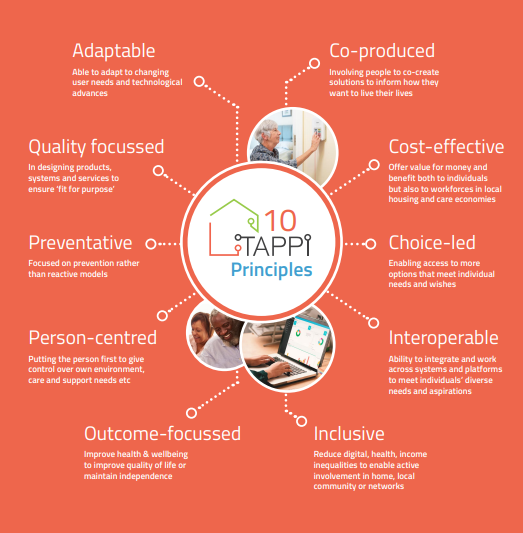TAPPI Phase 2 - Q&A with London Borough of Haringey

Six months after their recruitment as one of the six TAPPI testbeds, London Borough of Haringey gives us an update on their project in this short Q&A.
What initial challenges are you facing and how are they / will they be addressed?
Getting people to engage, effective coproduction and managing expectations have been the main challenges to date. In regards to engagement, we had reached out to lots of different groups and used different communications methods to reach out to people. This included knocking on over 100 doors to talk directly to people living in sheltered and extra-care accommodations. The people who we have recruited through these one-to-one conversations are now taking part in on-going communications including group discussions. We are hoping this approach will lead to shared learning and experiences and building our TAPPI Community.
What specific technologies or solutions are you testing, and what outcomes do you hope to achieve?
The areas that we are exploring are:
- Independence to control home environment and undertake day to day activities - Smart home technology.
- Safety and security concerns when at home and in the community. Falls detectors, who’s at my front door and SOS GPS trackers.
- Reduce feelings of isolation and desire to be better connected to others
- Easier access to home entertainment
- Health and wellbeing, being able to monitor own health and Hydration concerns
- Supporting Carer wellbeing
- Reminders and prompts for medication and carer visits
- Developing digital skills i.e. shopping and banking online
- To be able to identify technology and support requirements to enable people to live independently and safely.
Have you been able to test any of the 10 principles developed during the first phase of TAPPI? Which ones and what results are you seeing?
 (opens new window)Given the stage we are at the principles that we have had the most involvement with are coproduction, person-centred, preventative, inclusive and choice led.
(opens new window)Given the stage we are at the principles that we have had the most involvement with are coproduction, person-centred, preventative, inclusive and choice led.
From the work to date we are finding that person-centred is key as one size does not fit all. People have different levels of knowledge, confidence and outcomes that they are looking for. In identifying technology there needs to be choice, and opportunity to become familiar with the concept as well as the technology. Prevention is another key area, however people need to understand what prevention support they may need and how technology might help this.
What initial feedback have you had from tenants and staff as you begin implementation of the project?
Feedback has been varied across a number of areas, there was difficulty in getting people to engage in the first place.
Of those that are participating, the majority are open to technology supporting them in their wellbeing and independence. They understand the value of technology and the outcomes that it can lead to in this day and age. Whilst is valuable it should not replace human interactions.
There are concerns about costs and level of training to support them now and in the future. But excitement about getting and using the technology is clear.
Darshan Savani, Project Manager – TAPPI, Adults Transformation Team, London Borough of Haringey
